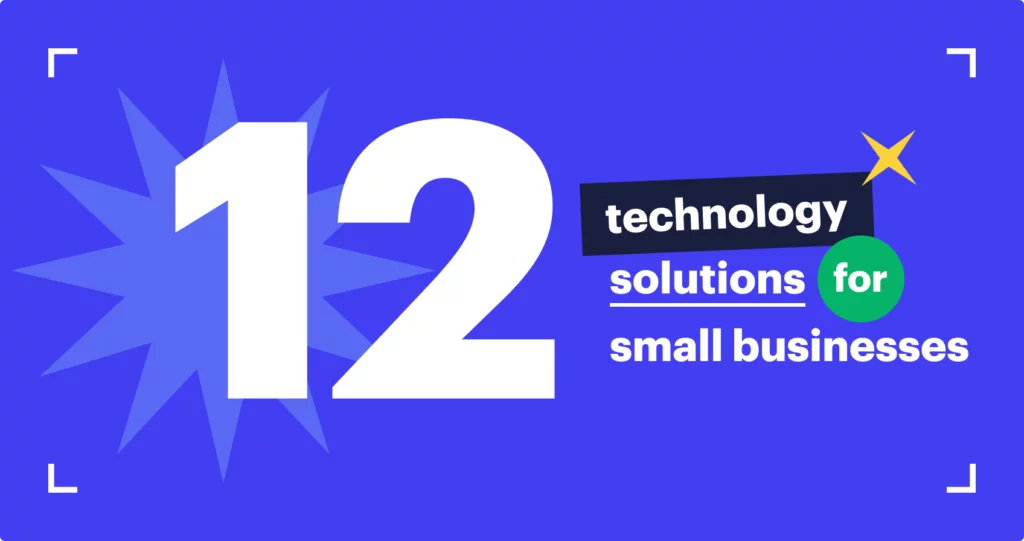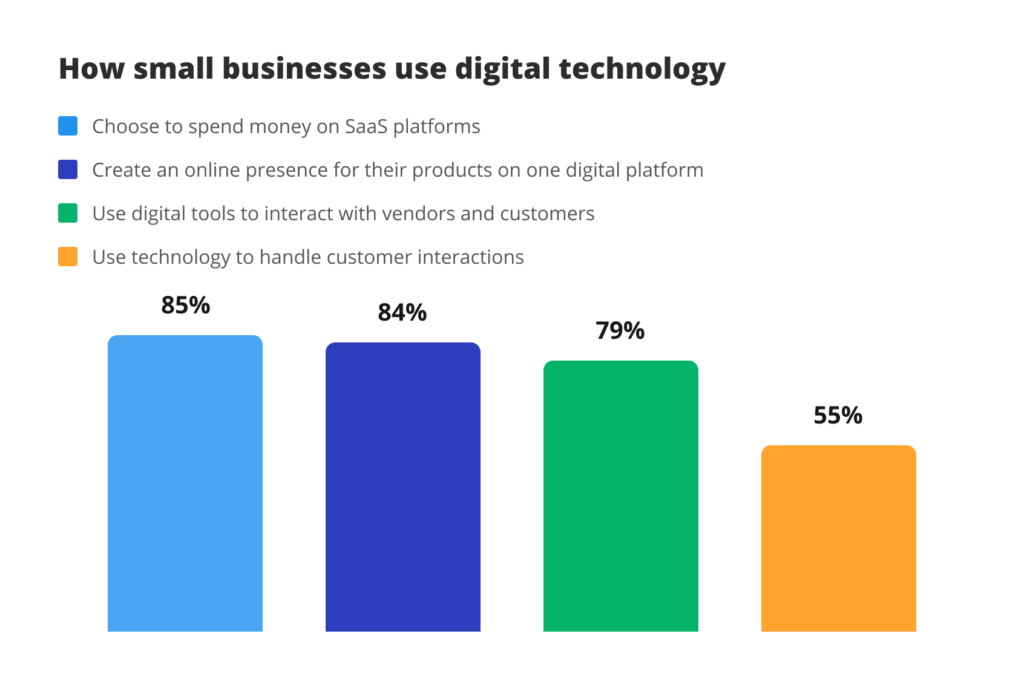Top 12 business technology solutions every small business should harness

If you’re a small business owner looking to get an advantage over your competitors, you cannot afford to miss out on the latest business technology and innovation trends. Fortunately, there are 21st-century tools designed to fit different business models and streamlined to help you run your business easier, more efficiently, and achieve increased margins.
Why should businesses adopt technology?
There’s a saying – work smarter, not harder. Getting involved in innovation and tech can not only help your business stay relevant but also save money, time, and much of the hassle that goes with running it.
The positive effects of business technology are limitless – you can increase the development speed, improve organizational infrastructure, collect and analyze data, test new business strategies, enhance customer support, and many more.
airSlate’s recent research suggests that 74% of businesses had to shut down during the pandemic due to not having information technology in place and depending on walk-in customers.
To demonstrate that the use of technology for business is the key factor that determines an organization’s success in the modern world, let’s look at the following small business stats from Semrush:
- 84% of small businesses create an online presence for their products on one digital platform
- 79% of small businesses interact with vendors and customers via digital tools
- 55% of small business owners believe technology is the best way to handle customer interactions
- About 85% of small businesses spend money on SaaS (Software as a Service)
- A typical small business utilizes between 25-50 SaaS solutions for their business activities

As you can see, most of your competitors have started to embrace technology solutions for business. But don’t be discouraged, we’ve got something that can give you the upper hand.
81% of small businesses have yet to fully capitalize on technology, according to recent tech statistics. And it gets better.
Small businesses adopting technology have proven to:
- double their revenue per employee
- achieve around 4x Annual Revenue Growth
- triple their ability to generate more jobs in the following year
Now, considering all of the above, let’s focus on some of the critical elements of a small business and the best digital products and IT solutions for businesses capable of enhancing its functions.
Top 12 small business technology solutions to harness digital transformation
1. No code software
At a time when many companies were transitioning to remote operations, no code software empowered users with little-to-no technical background to participate in digital transformation. Most no code applications use drag-and-drop tools and WYSIWYG (what-you-see-is-what-you-get) editors. Meanwhile, business process management and workflow automation tools use no-code bots to streamline routine manual tasks.
We can see the growth in demand for no code skills as they don’t need much time to master. A course covering the basics of no code may take a few hours to complete. No code democratizes software development and increases the speed of operations within organizations. Business analysts, CRM administrators, and marketers can build apps and automate workflows to fit their business needs.
For instance, airSlate‘s all-in-one document workflow automation solution allows users to set up a fully automated no-code workflow designed to fit a specific use case or industry. With airSlate, businesses can create and automate end-to-end workflows, automate document generation and contract management, streamline business processes with no-code Bots, and much more.
2. Business website
A business website is your company’s gateway to online visibility. To begin your journey on the web, you should claim your “internet real estate”, which is easy to achieve by building a website. Regardless of what you do on the web — whether it’s social media activities to advertising — your business website plays an important role.
WordPress is a content management system (CMS) used by a wide range of websites on the internet. If you’re looking for a simple business website with an easy-to-use interface but have limited technical knowledge, WordPress would be your ideal website platform.
On the other hand, some other CMS’s offer similar services to WordPress, such as Wix, Drupal, Shopify, Squarespace, and others. For some industries, these other platforms are far more effective than WordPress. So, feel free to do your due diligence and discover which one fits your needs.
3. Customer relationship management (CRM) and marketing automation
It’s no secret that customers make a business what it is. Hence, maintaining solid interactions with them is vital. That’s where customer relationship management (CRM) and marketing automation come into play. People often confuse these terms but they denote different things.
A CRM is a mechanism that keeps track of business leads, prospects, and clientele. On the other hand, marketing automation keeps track of all customer interactions, such as the web pages visited on a company’s website and which emails were opened. By combining these two, a business can identify the needs and preferences of its clients and figure out how to satisfy them.
Explore a diverse array of small business solutions combining CRM and marketing automation, streamlining operations and notably reducing expenses. Consider assessing CRM pricing to make an informed and cost-effective choice. Managing these business technology solutions can be challenging without having a good grasp of automation skills. Having skilled CRM administrators in your organization will ensure a smooth implementation and functioning of these innovative business technologies. Take a closer look at software like Zoho, Leadsquared, Basecamp, Bitrix 24, Insightly, and Clarizen are ideal. These are predominantly cloud-based platforms that offer lead, deal, project management, and other functions.
You can save customer contacts and use automated workflows at pocket-friendly prices. Specific small business IT solutions also allow for making calls and sending emails to leads via their record cards. This way, it’s easy to track your interactions with a specific lead. Most of the apps mentioned above offer free versions with restricted features.
To take your customer relationship management to the next level, you can use a platform like Podium to collect customer feedback. Customer reviews will help you build brand recognition and authority. Moreover, you can drive leads with the testimonies of your already satisfied customers.
4. Team collaboration
To scale your business, another piece of the puzzle you need to solve is streamlining collaboration to get the best out of your employees. In this respect, Asana, Notion, and Slack are some of the best project management tools also used to improve team collaboration and task management.
These are considered SaaS (Software as a Service) products that help teams design projects, share tasks for projects among teams, set deadlines, track progress, and share ideas that would help them perform their tasks. It’s very common for small businesses to use services, such as monday.com or monday.com alternatives, to create a seamless and collaborative remote work environment. Here you can read more about managing and tracking your projects with monday.com‘s work management tool.
5. eSignature

The use of electronic signature has increased over the last decade due to the rise in the adoption of smartphones and tablets. The COVID-19 pandemic contributed to the ever-increasing demand for eSignature among teams and companies of all sizes. According to airSlate’s eSignature research, the number of eSignature enterprise adopters soared by 50% due to the pandemic.
Small businesses can use electronic signatures for various purposes:
- to approve an agreement or contract
- to authenticate a document
- to sign documents remotely on someone else’s behalf
- to make an online purchase, and more
The number of organizations adopting eSignatures is rapidly increasing which means that more people are using them for their day-to-day business needs. Luckily, the eSignature market offers a wide range of small business solutions, including DocuSign alternatives, for a reasonable price.
6. Business proposals
Identifying your target market is one thing. Convincing them to buy your products is another. If you want to get paying customers, you must write irresistible, persuasive proposals.
Hiring a dedicated person to create business proposals can cost a fortune, and sometimes, this person may not deliver the results you need.
Instead, you could use applications like Better Proposals, PandaDoc, Qwilr, Proposify, or even copywriting tools such as Jasper AI. Most of this software is user-friendly and provides professional proposal templates. In addition, these tools will give your proposal the attractive look it deserves.
7. Social media and advertising
Is your goal to increase sales and customers through brand awareness? Then you should put yourself out there and advertise. While word of mouth and providing the best possible experience or product is ideal, developing social media activities could be a great start before hiring for a marketing agency. Fortunately, we now have digital advertising agencies performing better and delivering better results than traditional advertising.
Today, we have Google ads, Facebook ads, Bing ads, and socials. These services have enough resources at their disposal to spread the message of your brand to millions of people within minutes. Not only that, they’re able to help you target and retarget audiences based on your preferences. Indeed, compared to traditional advertising, their methods are more cost-effective.
8. General accounting
While we’re not all certified professional accountants, there’s plenty of dependable accounting software out there. Some of them include QuickBooks, FreshBooks, Wave Accounting, and AccountingEdge. Including these types of small business technology in your tech stack can be essential. If you want to go further with your accounting, an AP automation software like Rewardworks streamlines and simplifies the entire accounts payable process, helping your company efficiently manage invoices and payments.
With the software solutions for small business mentioned above, you can keep tabs on your revenue and expenditure with the aid of up-to-date financial reports, even if you’re using something as simple as an iPad for business. These reports can be quickly prepared if you link your bank account. Some of them also help you monitor your inventory.
9. Payroll software
One of the things you should never take for granted is your employees’ salaries getting paid on time. You would also need to deduct their taxes and pay them. There is a wide range of payroll software for small businesses that provide automatic tax and salary payments without hassle. These types of systems are effective at managing hundreds of employees and storing their employee details and previous wage data used in payment execution.
They can also offer some bonus HR features, like offer letters, org charts, PTO tracking, and employee onboarding. Fortunately, some of these digital business technologies are available for free. Examples of payroll outsourcing services for small companies include Onpay, Gusto, Paychex Flex, Rippling, Paycor, and so on.
10. Information technology security
The risk of getting hacked for companies that collect sensitive customer data is ever-present. Hence, business owners must ensure this data is secure at all times. There’s plenty of information technology for small businesses that offers high-level security services and ensures the integrity of the data you collect on the web.
This business technology includes ESET Smart Security, Malwarebytes for Business, End-User Endpoint Security, Webroot Business Endpoint Protection, and many other alternatives. As for mobile security amongst small companies, there is no need to go extreme and switch to a flip phone for security when there are several viable VPN services available for security and anonymity purposes.
11. Contract management

There are now several automated business technologies that assist with effective contract management. Some of them include airSlate, DocuSign, Eversign, Adobe Sign, SignRequest, and so on. Most of them offer quick, reliable small business software solutions for sending, signing, and approving documents in-office and remotely.
Contract management software solutions also feature reusable templates, signing guidance, payment processing, notifications, and record archives. In addition, you can use customized logos and color themes to modify contract emails. Depending on the software you choose, there could be smart forms with custom plans available for you to use when drawing up contracts.
You may need to dedicate some time to research the most suitable one for you. Choose one that is user-friendly for all parties involved in the signing process and can be used on browsers and devices.
12. Social bonding and community building
Every business needs to get its message in front of its customers. Therefore, social media has become an indispensable tool businesses use to build quality relationships with their customers, leads, and prospects.
In 2021, 75% of Gen Zers and 48% of Millennials made spending decisions based on what they saw in their interactions with brands on social media. Interestingly, no business is too big or small to harness the power of social media.
To gain traction on social media and build a strong community, you’ll need to plan and schedule your social media content. Some business technology that can help you do these include Hootsuite and Buffer. Both are effective scheduling tools that will make your social media activities easier and more efficient.
Scaling-up business models with technology
As a business owner looking to get ahead, you’re going to need to adopt small business technologies relevant to your operation model. The good news is that you don’t need to invest in each of the above technologies separately. Choosing a holistic solution that comprises the business technology stack you need can help you cut costs and get the best results.
Of course, this article’s list of business technology examples is not final. However, adopting some of them will put you in a better position to compete and scale within your industry.

